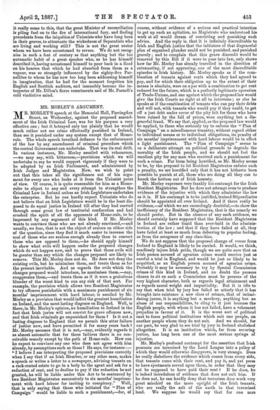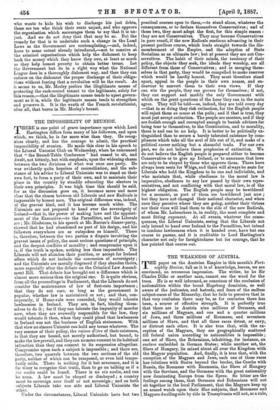MR. MORLEY'S ARGUMENT.
MR. MORLEY'S speech at the Memorial Hall, Farringdon Street, on Wednesday, against the proposed amend- ment of the Irish Criminal Law, was for his purpose a very effective one ; but it betrayed only too plainly that he would much rather not see crime effectually punished in Ireland, than see it punished under any system except that of Home- rule. The whole speech breathed defiance to the enforcement of the law by any amendment of criminal procedure which the central Government can undertake. That was its real drift. In various instances, Mr. Morley assailed with vehemence, —we may say, with bitterness,—provisions which we will undertake to say he would support vigorously if they were to
be adopted by an Irish Parliament, and administered by Irish Judges and Magistrates. Now, we wish to point out that this takes all the significance out of his argu- ment for every one who looks at it from the Unionist point of view. Of course, it is quite reasonable for him as a Home-
ruler to object to any and every attempt to strengthen the Criminal Law in Ireland unless an Irish Legislature undertakes the enterprise. But he can hardly expect Unionists who do not believe that an Irish Legislature would be in the least dis- posed to do equal justice in Ireland till after they had carried through some great law of territorial confiscation and had crashed the spirit of all the opponents of Home-rule, to be impressed by any argument of this kind. If Mr. Morley wants to convince those who are not already convinced,—and usually, we fear, that is not the object of orators on either side of the question, since they find it much easier to increase the zeal of those who are zealous enough already than to convert those who are opposed to them,—he should apply himself to show what evils will happen under the proposed changes which do not happen now, and to prove that those evils will be greater than any which the changes proposed are likely to remove. This Mr. Morley does not do. He does not deny the existing evils, but he minimises them, and treats them as for the present inevitable. And as regards the evils which the changes proposed would introduce, he maximises them,—nay, exaggerates them,—and treats them as if it were a gratuitous blunder of the worst kind to run any risk of that sort. For example, the provision which allows two Resident Magistrates to try offences punishable with a maximum punishment of six months' imprisonment with hard labour, is assailed by Mr. Morley as a provision that would inflict the greatest humiliation on Ireland, and the most lasting disgrace on England. Well, is there, in Mr. Morley's opinion, no humiliation to Ireland in the fact that Irish juries will not convict for grave offences now, and that Irish criminals go unpunished for them ? Is it not a lasting disgrace to England that we permit this utter failure of justice now, and have permitted it for many years back ? Mr. Morley assumes that it is not,—nay, evidently regards it as almost axiomatic that for these failures there is no con- ceivable remedy except by the path of Home-rule. How can he expect to convince any one who does not agree with him already, by assumptions such as these He says, for instance :— " I believe I am interpreting the proposed provisions correctly when I say that if an Irish Member, or any other man, makes a speech or writes a letter to a newspaper, advising tenants on a rack-rented estate to go in a body to the agent and ask for a reduction of rent, and to decline to pay if the reduction be not granted, he will be liable under this Act to be sentenced by two Resident Magistrates successively to six months' imprison- ment with hard labour for inciting to conspiracy." Well, that is only saying that those who initiated the "Plan of Campaign" would be liable to such a punishment,—f or, of course, without evidence of a serious and practical intention to get up such an agitation, no Magistrate who andel-idea his work at all would dream of convicting and punishing such advice. And the reply is, that it is infinitely discreditable to Irish and English justice that the initiators of that disgraceful plan of organised plunder could not be punished, and punished gravely ; and to complain that this grave discredit would be removed by this Bill if it were to pass into law, only shows how far Mr. Morley has already travelled in the direction of extenuating, if not approving, one of the most discreditable episodes in Irish history. Mr. Morley speaks as if the com- bination of tenants against rents which they had agreed to pay, and for which their obligation up to the extent of their means is absolute, were on a par with a combination to get rent reduced for the future, which is a perfectly legitimate operation of Trade-Unions, and one against which the proposed law would give the Irish Courts no right at all to intervene ; or else he speaks as if the combination of tenants who can pay their debts and will not, with tenants who would pay if they could, to get off a just debt under cover of the pity felt for those who have been ruined by the fall of prices, were anything hut a dis- graceful fraud. We say that, applied, as the proposed law would be applied, to those who seriously try to enforce the "Plan of Campaign" on a miscellaneous tenantry, without regard either to individual means or to individual obligations, its penalty of six months' imprisonment with hard labour would be in effect a light punishment. The "Plan of Campaign" seems to us a deliberate attempt on political grounds to degrade the morality of the Irish people, and we should not feel the smallest pity for any man who received such a punishment for such a crime. Far from being horrified, as Mr. Morley seems to be, by the proposal to let Resident Magistrates enforce such a penalty, we are horrified only that it has not hitherto been possible to punish at all, those who are doing all they can to knock the bottom out of Irish honesty.
Mr. Morley expresses very frankly his contempt for the Irish Resident Magistrates. But he does not attempt even to produce evidence of the injustice with which they administer the law as it is. If his contempt is to be justified, trained Stipendiaries should be appointed all over Ireland. And if there really be evidence,—,of which we are exceedingly doubtful,—to show the inefficiency of the Resident Magistrates, that is the remedy we should prefer. But in the absence of any such evidence, we should certainly have supposed that the Resident Magistrates in Ireland are rather timid than over-bold in the adminis- tration of the law ; and that if they have failed at all, they have failed at least as much from deferring to popular feeling, as from the arrogance of any class-bias.
We do not suppose that the proposed change of venue from Ireland to England is likely to be carried. It would, we think, needlessly injure Irish pride, though we are quite sure that an Irish person accused of agrarian crime would receive just as careful a trial in England, and would be just as likely to be acquitted, as an English person accused of agrarian crime. Probably it may be necessary to try by Special Commission crimes of this kind in Ireland, and no doubt the persons chosen to sit on such a Commission must be persons of the very highest character, both as regards legal attainment and as regards moral weight and impartiality. But it is idle to say that when trial by jury has failed so utterly that it has brought into existence a new class of crimes, that of intimi- dating jurors, it is anything but a mockery, anything but an abuse of our responsibilities, to cling to it just because the English people, with whom it has not failed, have a vehement prejudice in favour of it. It is the worst sort of political cant to force political institutions which suit one people, on another people whom they do not suit. And we should, for our part, be very glad to see trial by jury in Ireland abolished altogether. It is an institution which, far from securing justice, has long been one of the most serious springs of injustice.
Mr. Morley's profound contempt for the assertion that Irish peasants are terrorised by the Land League into a policy of which they would otherwise disapprove, is very strange. Does he really disbelieve the evidence which comes from every side, that tenants come with their rent, and pay it, and yet press to have ejectments served upon them, in order that they may not be supposed to have paid their rent I If he does, he is indeed incredulous of evidence that does not suit him. If he does not, he can hardly deny that terrorism does work very great mischief on the more upright of the Irish tenants, who are really the salt of the earth in that terrorised land. We suppose he would say that for one man
who wants to hide his wish to discharge his just debts, there are ten who think their rents unjust, and who approve the. organisation which encourages them to say that it is un- just. And we do not deny that that may be so. But the remedy for that is to undertake such a change in the Land Laws as the Government are contemplating,—and, indeed, have to some extent already introduced,—not to connive at the criminal organisations which help the dishonest to keep back the money which they know they owe, at least as much as they help honest poverty to obtain better terms. Let the Government but do in a right way what the National League does in a thoroughly dishonest way, and then they can enforce on the dishonest the proper discharge of their obliga- tions without fearing that a revolution will be the result. As it seems to us, Mr. Morley prefers the illegitimate means of protecting the rack-rented tenant to the legitimate, solely for this reason,—that the illegitimate means tends to upset govern- ment as it is, while the legitimate means tends to strengthen and preserve it. It is the wrath of the French revolutionist, after all, that burns in Mr. Morley's breast.



































 Previous page
Previous page